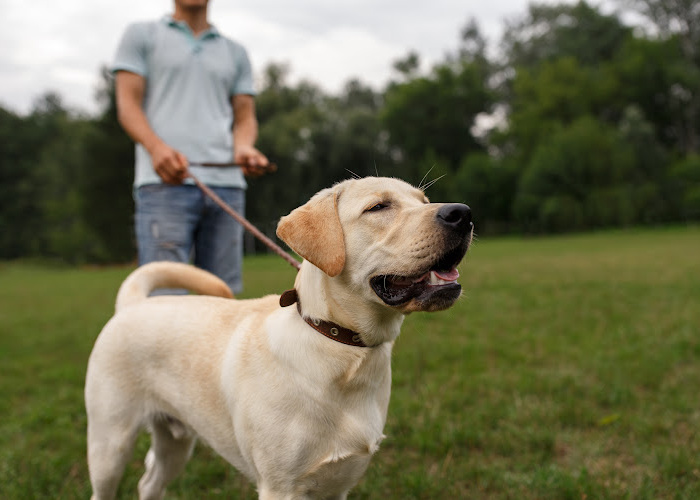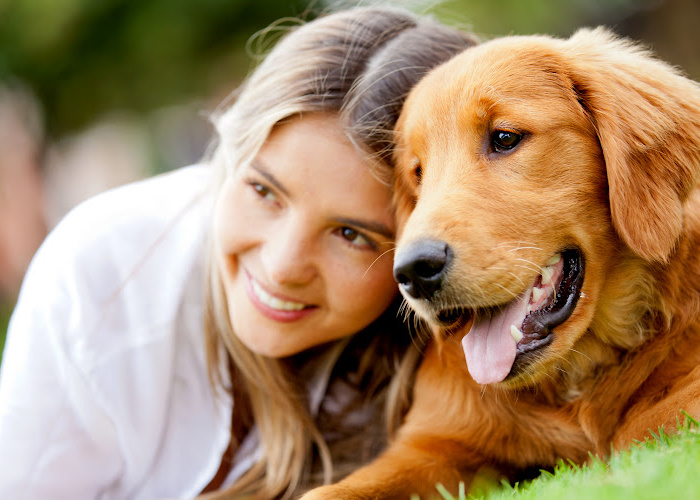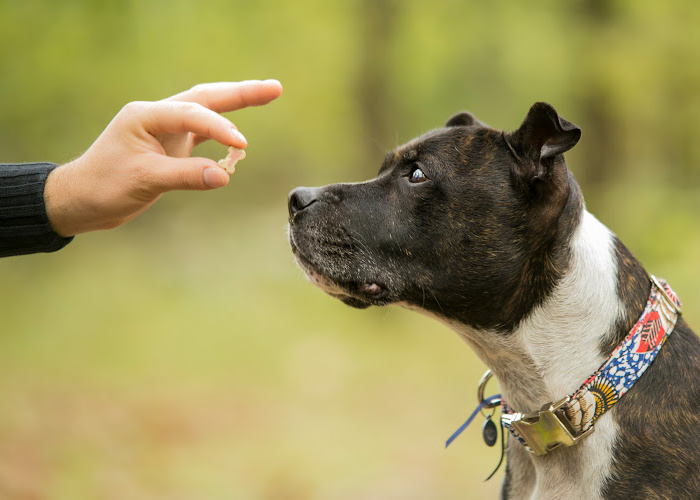It's crucial to know that students with autism and ADHD need special study strategies. Autism…

Can Dogs Be Autistic? The Ultimate Guide to Canine Autism
Have you ever watched your furry friend and wondered if their unique quirks were something more? If you’ve pondered, “Can Dogs be Autistic?” you’re not alone. The idea of autism in dogs is gaining attention as pet owners and researchers observe autism-like behavior in dogs.
While our tail-wagging companions can’t tell us how they feel, we can learn to read the signs of potential canine autism symptoms.
From repetitive actions to social withdrawal, the concept of dog autism is complex, but with the right guide, you can unlock a better understanding of dog behavioral disorders and how they may manifest in your beloved pet.
Stay tuned as we explore the nuances of this topic and provide you with the knowledge to foster a happier, healthier life for your four-legged family member.

Understanding Canine Autism and Its Relation to Dogs
When you notice peculiar behaviors in your furry friend, you might wonder, is autism possible in dogs? The concept of autism, widely recognized in humans as Autism Spectrum Disorder (ASD), raises intriguing questions about canine cognition and behavioral health.
While our understanding is still evolving, the current wisdom indicates that dogs could express signs of autism in dogs through various actions that seem uncharacteristic of normal dog behavior.
Perhaps you’ve spotted potential symptoms of autism in dogs, such as a lack of interest in social activities or a fascination with repetitive movements. These could be signs your dog is struggling with sensory processing or social integration issues that echo human experiences with ASD. Let’s consider the following key points:
- Repetitive Movements: Behavior such as relentless tail chasing or toy lining could be a reflection of your dog’s need for consistent patterns.
- Social Challenges: If your dog seems indifferent to interaction with humans or other dogs, these could be indicators of social difficulties associated with ASD.
- Sensory Sensitivity: A dog startled by everyday sounds or textures may be exhibiting signs of heightened sensory sensitivity, a common trait in autism diagnosis.
However, these signs necessitate a professional’s insight since the question of is autism genetic in dogs, or if it stems from other factors, remains a topic of research. Responsible pet ownership demands a cautious approach; identifying a diagnosis of autism in dogs is not to be taken lightly. The condition may resemble other behavior disorders and requires an expert’s evaluation.
Whether autism in dogs is due to genetics, environmental factors, or an intricate blend remains uncertain. While we navigate these unknown waters, it’s essential to seek advice from veterinarians or animal behaviorists. They can offer a reliable autism diagnosis in dogs and guide you through the nuances of dog psychology and physiology, ensuring that you provide the best support for your beloved pet.

Can Dogs Be Autistic: Examining the Behavioral Symptoms
When exploring the intriguing concept of autism spectrum disorder in dogs, one may wonder about the specific autistic behaviors in dogs that parallel those found in humans.
As you become more attentive to your furry companion’s actions, it’s essential to distinguish between typical dog quirks and potential signs of a deeper neurodevelopmental disorder.
Signs of Autism in Dogs
Autism in dogs symptoms might not be immediately apparent, but once you know what to look for, they can be revealing. For instance, a dog that doesn’t seem to bond with its owners or shows little interest in other dogs could be displaying a red flag. Other signs might include an unusual sensitivity to sensory stimuli or a disconcerting indifference to activities that typically excite dogs.
Patterns of Repetitive Behavior
There’s quirky, and then there’s concerning. If your dog is chasing its tail occasionally, it’s probably nothing to worry about. But if this becomes a compulsive act where they engage in the behavior to the point of exhaustion, or if they lick persistently in the absence of a medical issue, you might be looking at patterns of repetitive behavior, characteristic of dog socialization challenges.
The Complexity of Social Interactions and Communication
Communication is at the heart of socialization; this is true for humans and dogs alike. Dogs generally have a natural inclination to engage with their environment, but dog communication difficulties, such as lack of eye contact or response to your calls and commands, can be symptomatic of an autism-like condition.
Neurodevelopmental Disorder in Dogs: Is Autism a Possibility?
Do dogs have autism in the same way humans do? This question continues to spark debate among veterinarians and animal behaviorists. While there’s no clear-cut answer, certain genetic markers, such as mutations in the SHANK3 gene, suggest that dogs may experience a condition closely related to the autism spectrum disorder in humans.
As research unfolds, new insights pave the way for better understanding and supporting dogs who exhibit these behaviors. To truly cater to your dog’s needs, it’s crucial to recognize and properly address these challenges with empathy and informed care.

Therapeutic Interventions and Managing Autism Spectrum Disorder in Dogs
If you’re exploring treatment options for dogs with autism, it’s important to understand that each dog is unique. There’s a spectrum of therapeutic strategies to consider that can significantly enhance your dog’s quality of life.
In this section, we’ll delve into behavioral modification techniques, the perks of environmental enrichment, the modulating influences of diet and supplements, and the crucial step of seeking professional guidance.
Behavioral Modification Techniques
Behavioral therapy for dogs is a cornerstone in managing canine autism spectrum disorder (ASD). By implementing routine training and structured activities, you can help your dog overcome specific challenges like repetitive motions, which often lead to lower levels of stress and enhanced wellbeing.
- Positive reinforcement to encourage desired behaviors
- Consistency and patience in training routines
- Canine assistive technology that promotes interaction
Environmental Enrichment Benefits
Creating an engaging and stimulating environment can play a transformative role in your dog’s life. Adding sensory toys, agility equipment, and providing opportunities for mental stimulation can break the monotony and keep your dog active and engaged.
- Interactive toys to stimulate cognitive functions
- Safe spaces for retreat to reduce anxiety
- Sensory gardens or walks that offer new scents and experiences
Role of Diet and Supplements in Managing Symptoms
It’s no secret that diet affects behavior, and this also rings true for dogs with autism. Incorporating calming supplements for dogs can be a game-changer, offering natural relievers like L-theanine and chamomile. And let’s not forget the much-talked-about CBD oil for dogs with autism, which has shown promising results for reducing anxiety and enhancing mood stability.
- Nutraceuticals designed to support neurological health
- Omega-3 fatty acids for brain function optimization
- Specialized therapeutic diets tailored to your dog’s specific needs
When to Seek Professional Advice
Recognizing when it’s time to consult a professional is paramount. Should the symptoms of ASD become more pronounced, or you find yourself uncertain about the right approach, reach out to a vet or a certified animal behaviorist. Their expertise can provide a personalized treatment plan for your canine friend and steer you towards the appropriate interventions and resources.
Remember, you’re not alone in this. There are communities and professionals who specialize in the treatment of dogs with ASD. With the right support, you can ensure that your dog leads a comfortable and fulfilling life, irrespective of the challenges ASD might pose.

Conclusion
In navigating the nuanced landscape of dog neurological disorders and dog behavioral disorders, understanding the symptoms that may resemble autism is vital. Though the existence of autism in dogs isn’t definitively established, behaviors observed in canines have spotlighted the question and challenged us to explore the possibilities. Differentiating between what might be standard for your dog versus what may signal an underpinning condition is essential. Mislabeling regular dog behavior or unrelated medical concerns as canine autism symptoms could lead to unnecessary confusion or misguidance.
Augmenting the quality of life for dogs with autism demands a hands-on approach, tailored to each dog’s individual needs. As a pet owner, offering support for dogs with autism means being patient and attentive, promoting a dependable routine, and engaging in therapies conducive to your dog’s comfort and security. The overarching goal is effective managing of canine autism symptoms, geared towards creating a nurturing environment where your dog can thrive despite any challenges.
The path ahead beckons further inquiry and understanding. With advancements in veterinary research, the hope is to demystify the complexities surrounding autism-like behaviors in our dogs, sharpen diagnostic tools, and refine strategies to support them. Your commitment to their well-being and adapting to their unique circumstances can pave the way for a happier, more connected life with your canine companion.

FAQ
Can dogs be autistic?
While there’s no definitive answer, dogs can exhibit behaviors that are suggestive of autism spectrum disorder (ASD), such as social withdrawal and repetitive actions. However, these behaviors may also indicate other neurodevelopmental or behavioral disorders.
What are some signs of autism in dogs?
Signs that may indicate autism-like behavior in dogs include difficulties with social interaction such as lack of interest in other dogs or people, repetitive movements like tail chasing, unusual sensitivities to sensory stimuli, and inconsistent responsiveness to commands.
Is autism genetic in dogs?
Research suggests there may be a genetic component to certain autism-like behaviors in dogs. Mutations in specific genes, similar to those associated with human autism, have been observed in dogs displaying these behaviors.
How is autism diagnosed in dogs?
Diagnosing autism in dogs is a complex process that relies on behavioral observations and the exclusion of other conditions. A veterinarian or a canine behaviorist can evaluate a dog’s symptoms to determine if they align with autism-like behaviors.
How can I manage my dog’s autism-like symptoms?
Management may include behavioral therapy, environmental enrichment, targeted diets, and calming supplements. Interventions such as CBD oil have also been suggested for helping to stabilize mood and reduce anxiety.
When should I seek professional advice for my dog’s behavior?
If you observe any concerning behaviors in your dog that may suggest autism-like symptoms or other neurodevelopmental disorders, it’s important to consult with a veterinarian or a canine behaviorist for a thorough assessment and guidance on appropriate treatment options.
Can environmental enrichment help dogs with autism?
Yes, environmental enrichment, including sensory stimulation and cognitive challenges, can help to improve the quality of life for dogs with autism-like symptoms by reducing stress and providing appropriate outlets for their behaviors.
Are there specific dietary considerations for dogs with autistic behaviors?
While there is no one-size-fits-all diet for dogs with autism-like behaviors, some may benefit from diets formulated to address anxiety or hyperactivity. Ingredients such as L-theanine and chamomile might be helpful as well.
Can assistive technology be used to support dogs with autism-like symptoms?
Assistive technologies are emerging for dogs with behavioral and neurological challenges, including autism-like symptoms. Items such as specialized toys and puzzle feeders can offer mental stimulation and aid in managing repetitive behavior.
How important is routine for a dog that may have autism?
A consistent and stable routine can greatly benefit dogs with autism-like symptoms by providing a structured environment that reduces anxiety and helps manage expectations for both the dog and the owner.



This Post Has 0 Comments